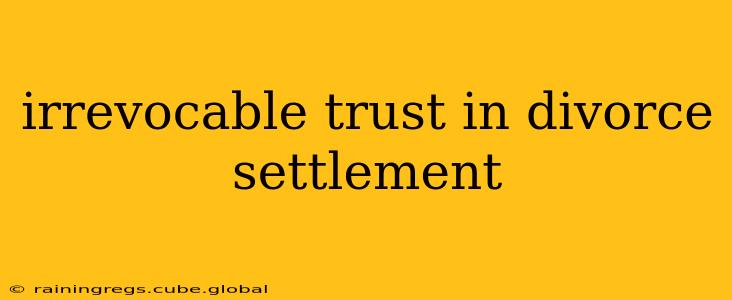Divorce settlements often involve complex financial arrangements, and irrevocable trusts can play a significant role in these proceedings. Understanding how these trusts function within the context of divorce is crucial for both parties involved. This guide provides a comprehensive overview of irrevocable trusts in divorce settlements, addressing common questions and concerns.
What is an Irrevocable Trust?
An irrevocable trust is a legal entity created when a grantor transfers assets to a trustee, who manages them for the benefit of beneficiaries. Once established, the grantor generally cannot change or revoke the trust’s terms. This permanence is key to its use in divorce settlements, providing a level of security and finality that other arrangements may lack. The specific terms of the trust, including the beneficiaries and the distribution schedule, are outlined in a legal document.
How are Irrevocable Trusts Used in Divorce Settlements?
Irrevocable trusts offer several advantages in divorce settlements:
- Asset Protection: Assets placed in an irrevocable trust are generally shielded from the claims of creditors, including a spouse in a divorce proceeding. This protection can be especially important for high-net-worth individuals.
- Estate Planning: Irrevocable trusts can be incorporated into broader estate planning strategies, ensuring the orderly distribution of assets after death, regardless of the divorce outcome.
- Tax Advantages: Depending on the trust’s structure and the specific assets involved, certain tax benefits may be achieved. However, it's crucial to consult with a tax professional to understand the implications.
- Control and Management: The trustee, acting under the terms of the trust, manages the assets, offering a level of control and oversight that can be beneficial in complex divorce situations.
What are the Benefits of Using an Irrevocable Trust in a Divorce Settlement?
The benefits extend beyond simply protecting assets. They offer clarity and structure in a frequently contentious environment. By establishing clear terms regarding asset distribution and management, irrevocable trusts can reduce future disputes and litigation costs. This is particularly beneficial if there are complex asset holdings or if one party is concerned about the financial responsibility of the other.
Can I Change or Revoke an Irrevocable Trust After it's Created?
No, the defining characteristic of an irrevocable trust is its permanence. Once established, altering or revoking the trust's terms is generally impossible, unless specifically provided for within the original trust document itself. This inflexibility highlights the importance of careful consideration and legal counsel before establishing such a trust.
What Happens to an Irrevocable Trust in the Event of a Subsequent Marriage or Divorce?
The impact of a subsequent marriage or divorce on an irrevocable trust depends entirely on the trust's terms. If the trust document explicitly addresses these contingencies, its provisions will guide the distribution of assets. However, if the document lacks such provisions, legal disputes may arise, necessitating court intervention.
How do I choose the right trustee for my irrevocable trust?
The selection of a trustee is critical to the success of the irrevocable trust. The trustee must be a responsible and impartial individual or institution capable of managing the trust assets according to the trust's terms. Factors to consider include the trustee's experience, financial acumen, and their ability to make objective decisions in the best interests of the beneficiaries. Common trustee choices include a trusted family member, a professional trustee company, or a bank.
What are the potential drawbacks of using an irrevocable trust in a divorce settlement?
While offering numerous advantages, irrevocable trusts also have potential drawbacks:
- Loss of Control: The grantor relinquishes control over the assets once they are placed in the trust.
- Complexity: Establishing and managing an irrevocable trust is a complex process requiring legal and financial expertise.
- Irreversibility: The inability to easily change or revoke the trust can lead to problems if circumstances change unexpectedly.
- Potential for Disputes: Even with a well-drafted trust document, disputes regarding interpretation or management can still occur.
This information is for educational purposes only and should not be considered legal advice. Consult with a qualified legal and financial professional to determine the best course of action for your specific circumstances. The complexities of irrevocable trusts in divorce require careful planning and expert guidance to ensure the desired outcomes are achieved.
